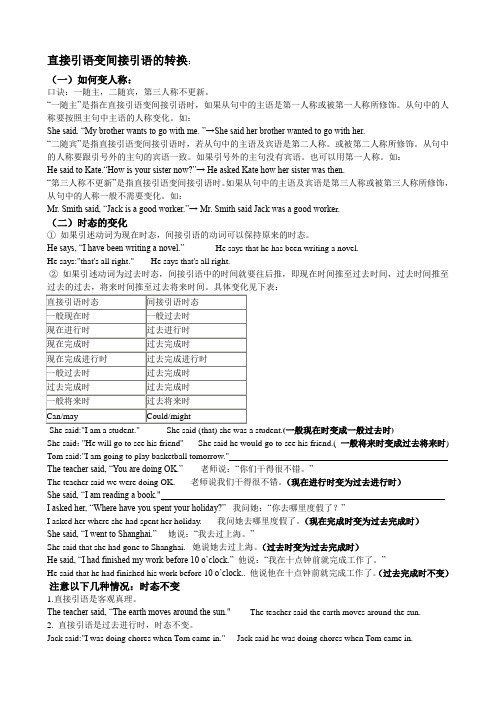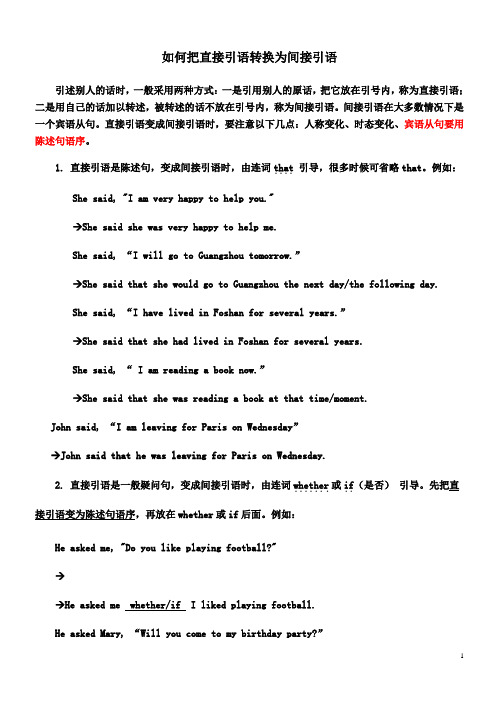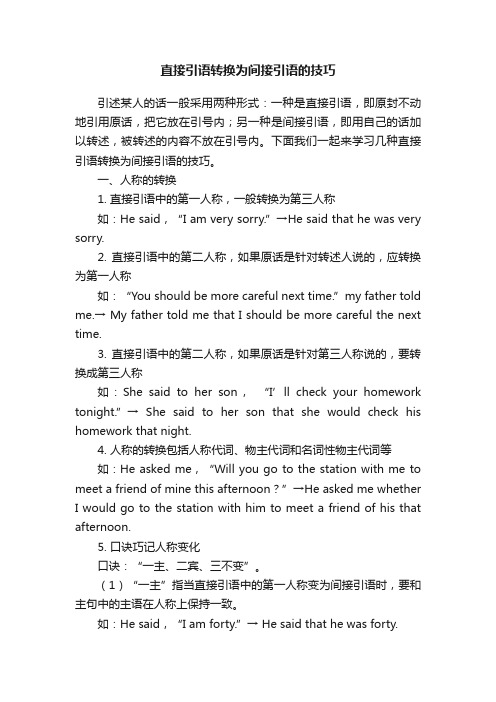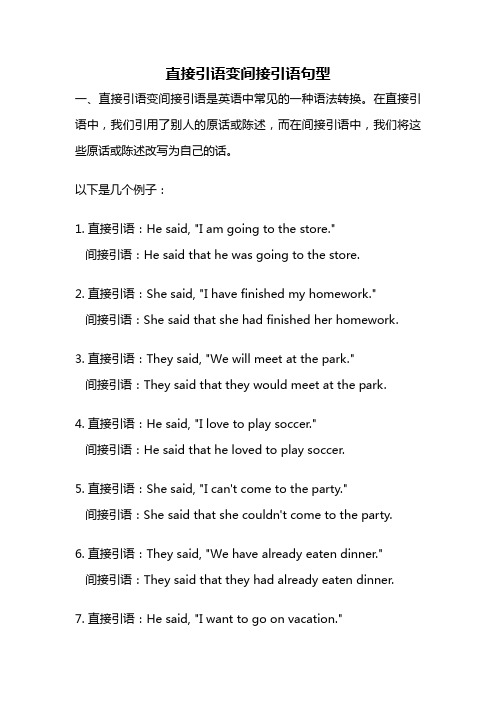英语语法-如何把直接引语转换为间接引语
英语语法:直接引语变间接引语

英语语法:直接引语变间接引语英语语法:直接引语变间接引语英语语法是针对英语语言进行研究后,系统地总结归纳出来的一系列语言规则。
英语语法的精髓在于掌握语言的使用。
在英语六级的学习过程中有哪些直接引语变间接引语的方法呢?下面就让店铺为大家整理的英语语法:直接引语变间接引语,一起来看看吧。
一、概述引用或转述别人说的话时有两种方法:直接引述别人的原话,这叫做直接引语(direct speech)。
用自己的话转述别人的话,叫间接引语(indirect speech)。
一般地讲,直接引语前后要加引号,间接引语不用引号,而用宾语从句来表达。
Mr. Black said, “I'm busy.”布菜克先生说:“我很忙”。
(直接引语)Mr. Black said that he was busy.布菜克先生说他很忙。
(宾语从句是间接引语)从上例看来,直接引语改为间接引语时,除将直接引语改为宾语从句之外,还须对直接引语中的人称和时态进行相应的变化,如上例直接引语中的I改成了he, am则改成了was。
现将由直接引语改为间接引语时应注意的问题,分述如下:二、直接引语是陈述句时直接引语如果是陈述句,变为间接引语时,用连词that引导(that 在口语中常省去),that从句之前用say、tell等动词,从句中的人称、时态、指示代词、时间状语、地点状语等要作相应的变化。
1、人称的变化直接引语改为间接引语人称要相应的变化,把直接引语中的第一人称(如:I,me,my,mine,we,us,our,ours)变为与主句的主语相一致的人称。
把直接引语中的第二人称(you,your,yours)变为和主句的间接宾语(即听话人,如无听话人,可根据上下文的体会人为确定一个人称)相一致的人称。
直接引语中的第三人称(he,him,his,she,her,hers,it,its,they,their,theirs,them)变为间接引语时,人称不变。
英语语法大攻克--直接引语改间接引语之陈述句

直接引语改为间接引语(直接引语为陈述句)注意: 1. 连词that引导2. 人称的改变(一随主、二随宾、三不变)3. 时态的变化 (主句用现在时或将来时,从句可用任何时态;主句用过去时,从句用与过去相关的时态。
)4. 如果直接引语是表示客观真理时,变为间接引语,时态不变如:The teacher said "The earth goes round the sun."→The teacher said(that)the earth goes round the sun.一、把直接引语改为间接引语(主句为一般现在时)1.‘We go to school on Saturday, too.’They say ____ ____________ to school on Saturday.2.‘I want to give your sister a Christmas card.’Kelly says __________ _____ to give ______ ___ sister a Christmas card. 3.‘I will visit my daughter in March.’Professor Watts says _____________________ visit ____ _ daughter in March. 4.She says, ‘I’m glad to meet you.’She tells us ________ glad to meet ______.5.David says, ‘ I want to hear their songs.’David says ________________ to hear _________二、把直接引语改为间接引语(主句为一般过去时)1. ‘I am a solider.’He said ___________ a solider2. ‘We are at the race.’They said _________________ at the race3. ‘They don’t have any books about stamps.’Rik told Annie ______________ have any books about stamps.4. ‘I need the cook’s telephone number.’Zak said________________________ the cook’s telephone number.5. ‘She is running along the street.’She said ______________ along the street.三、把直接引语改为间接引语(两种时态混用)6.Sally says, ‘Our exams are starting this week.’Sally says ______________ starting this week.7. ‘I am going to read these.’My mother said ___________________________________.8. ‘I shall find an easier job.’He said ____________________________________.9.The doctor says, ‘Y ou’ll have to stay at home until I come to see you again’The doctor says ________ have to stay at home until____ come to see_____ again.10.Janet says, ‘ She doesn’t like her new bike.’Janet says ____ ___ like __ ___ new bike.11. ‘Y ou must be on time for your lessons.’He said ________ ________ on time for ____ _______.12. She said to him, ‘It’s time for you to leave here.’She said to him_________ ___________________.13.Jack says, ‘Y ou must finish your homework first.’Jack says to me ___ ___ must finish _____ __ homework first.14. ‘It may be a good idea.’She said ____ _______ be a good idea.15.Kate says, ‘I’m doing some shopping when we meet in the park.’Kate says___ ______doing some shopping when __________ in the park.’16. ‘I will be a pilot when I grow up.’He told us _____________________________________17.The students say, ‘We would like to be teachers so we must study hard.’The students say ___ ___ would like to be teachers so _______ must study hard.18. ‘Y ou can’t all be managers.’He told us ________________________________________.19. ‘I have lost a book about animals.’She said _______________ a book about animals.20. The teacher said, ‘the earth is round.’The teacher said .。
英语语法直接引语和间接引语

英语语法----直接引语和间接引语一、 定义:1、 直接引语:使用引号引出别人的原话。
2、间接引语:用自己的话把别人的话转述出来。
二、 直接引语和间接引语的转换直接引语变间接引语时,要注意人称、时态、指示代词、时间状语和地点状语的变化。
1、 人称变化口诀如下:一随主,二随宾,第三人称不更新。
“一随主”即把直接引语中的第一人称(如:I ,me ,my ,mine ,we ,us ,our ,ours)变为与主句的主语相一致的人称。
“二随宾”即把直接引语中的第二人称(you ,your ,yours)变为和主句的间接宾语(即听话人,如无听话人,可根据上下文的体会人为确定一个人称)相一致的人称。
“第三人称不更新”即直接引语中的第三人称(he ,him ,his ,she ,her ,hers,it ,its,they,their ,theirs ,them)变为间接引语时,人称不变。
一随主:He said , “I like it very much.” 他说:“我非常喜欢它”。
→liked it very much. 他说他非常喜欢它。
(I 改为he, it 不变)二随宾:He?said,?“You ?told?me?this?story.”他说:“你给我讲过这个故事。
”?? →He?said?that?I?had?told?him?that?story.他说我给他讲过那个故事。
(本句中宾语是me ,所以You 改为I ,?me 改为him,?told 改为had?told)?She said to Mary ,”How do you ?”go to work everyday?” →She asked Mary how she went to work everyday. 第三人称不更新:He said to me, “She’s left her book in your room ”.他对我说:“她把书放在你的房间里去了。
初中英语语法:直接引语变间接引语详解附练习及答案

直接引语和间接引语Direct speech and Indirect speech1.什么是直接引语?----直接引述别人的原话,一般加冒号,且没有时态呼应的问题;如:He said, “I’m afraid I can’t finish the work.”2.什么是间接引语?-----用自己的话转述别人的话,不用引号,通常情况构成宾语从句,从句中的语序,时态,人称,时间状语,地点状语,和指示代词等都有变化。
如:He said that he was afraid he couldn’t finish the work.3. 为什么要把直接引语变成间接引语?----当你需要转述别人的话的时候就需要用到;除了用say,还可以用tell, ask等。
4.所转述的内容可以是陈述句,疑问句,特殊疑问句,祈使句,感叹句,这几种情况下该怎么将直接引语变成间接引语呢?只要记住刚刚说的那6点:语序,时态,人称,时间状语,地点状语,和指示代词,记住相对应的变化规则,那么就不是一件难事。
下面我们来看例子:直接引语:He said, “My dad will be back tomorrow morning”间接引语:He said that his dad would be back the next/following morning..我们来分析一下这个例句,时态,人称,时间状语都发生了变化My dad---his dad, will be back---would be back, tomorrow morning---the next/following morning一、下面我们先看时态不变的5种情况:1)直接引语是客观真理,自然现象,名言,俗语,或者与一个具体的过去时间连用说明客观事实时,不管主句的谓语动词是什么时态,变为间接引语的时候时态均不变,如:Eg.1---“The earth moves around the sun,” the teacher told us.The teacher told us the earth moves around the sun.Eg.2---He said, “I was born in Guangdong in 1990”.He said he was born in Guangdong in 1990.Eg.3---Goethe said, “The important thing in life is to have a great aim, and the determination to attain it.”Goethe said the important thing in life is to have a great aim, and the determination to attain it.Eg.4:He said, “Practice makes perfect.”He said that practice makes perfect.2)主句的谓语动词是现在是或将来时,变成间接引语时时态不变Eg.1---He says, “I finished the work.”He says he finished the work.Eg.2---He will say, “I have watered the flower.”He will say he has watered the flower.Eg.3---He will say, “I will try my best to help you.”He will say he will try his best to help me.3)直接引语如果是一般现在时,表示反复出现或习惯性动作,变为间接引语时时态不变。
直接引语变间接引语的转换

直接引语变间接引语的转换:(一)如何变人称:口诀:一随主,二随宾,第三人称不更新。
“一随主”是指在直接引语变间接引语时,如果从句中的主语是第一人称或被第一人称所修饰。
从句中的人称要按照主句中主语的人称变化。
如:She said. “My brother wants to go with me. ”→She said her brother wanted to go with her.“二随宾”是指直接引语变间接引语时,若从句中的主语及宾语是第二人称。
或被第二人称所修饰。
从句中的人称要跟引号外的主句的宾语一致。
如果引号外的主句没有宾语。
也可以用第一人称。
如:He said to Kate.“How is your sister now?”→ He asked Kate how her sister was then.“第三人称不更新”是指直接引语变间接引语时。
如果从句中的主语及宾语是第三人称或被第三人称所修饰,从句中的人称一般不需要变化。
如:Mr. Smith said, “Jack is a good worker.”→ Mr. Smith said Jack was a good worke r.(二)时态的变化①如果引述动词为现在时态,间接引语的动词可以保持原来的时态。
He says, “I have been writing a novel.”------- He says that he has been writing a novel.He says:"that's all right."----- He says that's all right.②如果引述动词为过去时态,间接引语中的时间就要往后推,即现在时间推至过去时间,过去时间推至过去的过去,将来时间推至过去将来时间。
具体变化见下表:She said:"I am a student."------- She said (that) she was a student.(一般现在时变成一般过去时)She said:"He will go to see his friend"-----She said he would go to see his friend.(一般将来时变成过去将来时) Tom said:"I am going to play basketball tomorrow."The teacher said, “You are doing OK.”老师说:“你们干得很不错。
直接引语与间接引语的转换技巧

直接引语与间接引语的转换技巧在日常生活和学术写作中,我们经常会用到直接引语和间接引语来引述他人的话语或观点。
直接引语是将别人的原话直接引用,而间接引语是将别人的原话进行转述。
正确地使用直接引语和间接引语是写作中必不可少的技巧,本文将介绍一些转换技巧,并举例说明其正确应用。
一、直接引语的转换1. 改变人称和时态当将直接引语转换为间接引语时,要注意改变人称和时态。
一般来说,第一人称要转换为“第三人称”,现在时要转换为“过去时”。
例如,直接引语:“I love reading.”(我喜欢阅读。
)间接引语:“She said that she loved reading.”(她说她喜欢阅读。
)2. 改变时间和地点状语在转换为间接引语时,也要对时间和地点状语进行相应的改变。
例如,直接引语:“He said, 'I will go to the library tomorrow.'”(他说:“我明天会去图书馆。
”)间接引语:“He said that he would go to the library the next day.”(他说他会在第二天去图书馆。
)3. 注意连接词的变化在转换为间接引语时,需要注意连接词的变化。
例如,“I think”可以改为“I thought”或“he thought”。
例如,直接引语:“She said, 'I think it's a good idea.'”(她说:“我认为这是个好主意。
”)间接引语:“She said that she thought it was a good idea.”(她说她认为这是个好主意。
)二、间接引语的转换1. 恢复直接引语的原貌有时候,在间接引语中需要恢复原引语的直接引语形式。
例如,直接引语:“He told me, 'I will come tomorrow.'”(他告诉我:“我明天会来。
(完整版)英语语法如何把直接引语转换为间接引语

如何把直接引语转换为间接引语引述别人的话时,一般采用两种方式:一是引用别人的原话,把它放在引号内,称为直接引语;二是用自己的话加以转述,被转述的话不放在引号内,称为间接引语。
间接引语在大多数情况下是一个宾语从句。
直接引语变成间接引语时,要注意以下几点:人称变化、时态变化、宾语从句要用陈述句语序。
1. 直接引语是陈述句,变成间接引语时,由连词that....引导,很多时候可省略that。
例如:She said, "I am very happy to help you."→She said she was very happy to help me.She said, “I will go to Guangzhou tomorrow.”→She said that she would go to Guangzhou the next day/the following day.She said, “I have lived in Foshan for several years.”→She said that she had lived in Foshan for several years.She said, “ I am reading a book now.”→She said that she was reading a book at that time/moment.John said, “I am leaving for Paris on Wednesday”→John said that he was leaving for Paris on Wednesday.2. 直接引语是一般疑问句,变成间接引语时,由连词whether.......或if..(是否)引导。
先把直接引语变为陈述句语序,再放在whether或if后面。
例如:He asked me, "Do you like playing football?"→→He asked me whether/if I liked playing football.He asked Mary, “Will you come to my birthday party?”→You will come to my birthday party.→He asked Mary whether/if she would come to his birthday party.注意:大多数情况下,if和whether 可以互换,但后有or not,或在动词不定式前,或放在介词后作连接词时,一般只用whether。
直接引语如何转换为间接引语

5、直接)陈述句。用连词that引导,that在口语中常省略。 • 2)直接引语为一般疑问句,(也称是否疑问句,)间接引语用 连词whether或if引导,原主句中谓语动词said要改为asked( me/him/us等),语序是陈述句的语序。 He said, “Do you have any difficulty with pronunciation?”—> He asked(me)whether/if I had any difficulty with my pronunciation. He said, “You are interested in English, aren't you?”——> He asked whether I was interested in English.
• 5)直接引语为祈使句时,改为间接引语,用带to的不定式表达 ,谓语动词常是ask, advise, tell, warn, order, request等。如ask sb. to do,(由肯定祈使句变成)ask sb. not to do(由否定祈使句 转变),并且在不定式短语中的时间状语、地点状语、人称及 时态都作相应的变化。如: He said,“Be seated, please.”——> He asked us to be seated. “Do be careful with your handwriting.” He said. ——> He told me to be careful with my handwriting. “Never come here again!” said the officer nearby. ——> The officer ordered the villagers never to go there again. “Don't touch anything in the lab without permission,” the teacher said. ——> The teacher warned the students not to touch anything in the lab without permission.
直接引语转换为间接引语的技巧

直接引语转换为间接引语的技巧引述某人的话一般采用两种形式:一种是直接引语,即原封不动地引用原话,把它放在引号内;另一种是间接引语,即用自己的话加以转述,被转述的内容不放在引号内。
下面我们一起来学习几种直接引语转换为间接引语的技巧。
一、人称的转换1. 直接引语中的第一人称,一般转换为第三人称如:He said,“I am very sorry.”→He said that he was very sorry.2. 直接引语中的第二人称,如果原话是针对转述人说的,应转换为第一人称如:“You should be more careful next time.”my father told me.→ My father told me that I should be more careful the next time.3. 直接引语中的第二人称,如果原话是针对第三人称说的,要转换成第三人称如:She said to her son,“I’ll check your homework tonight.”→ She said to her son that she would check his homework that night.4. 人称的转换包括人称代词、物主代词和名词性物主代词等如:He asked me,“Will you go to the station with me to meet a friend of mine this afternoon?”→He asked me whether I would go to the station with him to meet a friend of his that afternoon.5. 口诀巧记人称变化口诀:“一主、二宾、三不变”。
(1)“一主”指当直接引语中的第一人称变为间接引语时,要和主句中的主语在人称上保持一致。
如:He said,“I am forty.”→ He said that he was forty.(2)“二宾”指当直接引语中的第二人称变为间接引语时,要和主句中的间接宾语保持人称上的一致。
直接引语和间接引语的转换方法

直接引语和间接引语的转换方法直接引语和间接引语是英语中常见的两种引述方式。
直接引语是将某人的原话直接用引号括起来,而间接引语则是将他人的话转述出来。
在英语写作中,我们经常需要进行直接引语和间接引语的转换。
本文将介绍关于直接引语和间接引语的转换方法。
一、直接引语的转换为间接引语当我们需要将直接引语转换为间接引语时,需要注意以下几点:1. 主要变化:将引号去掉,改为使用"that"引导从句。
例如:直接引语:“I am going to the park,” she said.间接引语:She said that she was going to the park.2. 时态变化:根据引语所表示的时间改变时态。
例如:直接引语:“I am studying English,” he said.间接引语:He said that he was studying English.3. 人称变化:根据引语所表示的人称改变人称。
例如:直接引语:“I will help you,” he said.间接引语:He said that he would help me.4. 指示变化:根据引语中的指示词改变指示词。
例如:直接引语:“This is a book,” she said.间接引语:She said that that was a book.5. 修饰变化:根据引语中的修饰词改变修饰词。
例如:直接引语:“I love this beautiful city,” she said.间接引语:She said that she loved that beautiful city.二、间接引语的转换为直接引语当我们需要将间接引语转换为直接引语时,需要注意以下几点:1. 去除“that”:将从句中的"that"去除。
例如:间接引语:She said that she was busy.直接引语:“I am busy,” she said.2. 时态变化:根据引语所表示的时间改变时态。
直接引语变间接引语句型

直接引语变间接引语句型一、直接引语变间接引语是英语中常见的一种语法转换。
在直接引语中,我们引用了别人的原话或陈述,而在间接引语中,我们将这些原话或陈述改写为自己的话。
以下是几个例子:1. 直接引语:He said, "I am going to the store."间接引语:He said that he was going to the store.2. 直接引语:She said, "I have finished my homework."间接引语:She said that she had finished her homework.3. 直接引语:They said, "We will meet at the park."间接引语:They said that they would meet at the park.4. 直接引语:He said, "I love to play soccer."间接引语:He said that he loved to play soccer.5. 直接引语:She said, "I can't come to the party."间接引语:She said that she couldn't come to the party.6. 直接引语:They said, "We have already eaten dinner."间接引语:They said that they had already eaten dinner.7. 直接引语:He said, "I want to go on vacation."间接引语:He said that he wanted to go on vacation.8. 直接引语:She said, "I am not feeling well."间接引语:She said that she was not feeling well.9. 直接引语:They said, "We are going to the beach tomorrow."间接引语:They said that they were going to the beach tomorrow.10. 直接引语:He said, "I have never been to Europe."间接引语:He said that he had never been to Europe.二、通过将直接引语转换为间接引语,我们可以在叙述他人话语的同时保持句子的整体完整性。
经典直接引语变间接引语

讲解注意点
直接引语变间接引语要注意以下 变化。
• 连接词 • 语序 • 时态 • 指代(人称、指示代词、时间状
语和地点状语)
注意连接词的变化
1.直接引语为陈述句,用that做连接词。 • He said, “Jim likes it very much.” • → He said that he liked it very much. 2.直接引语为一般疑问句,用if或wether做连接词。
you for a long time.” →Mr Smith said to his girl friend that he had not seen her for a long time.
直接引语改变为间接引语
2、直接引语如果是一般疑问句,变为间接引语时,需用从 属连接词whether或if引导,词序要改变。 Lily said to Miss Green, "Is it made in China?”
• →He asked his little sister not to cry any more.
What did Garfield say?
I’m lazy. He said he was lazy.
I’m hard-working sometimes. He said he was hard-working sometimes. I’m good at riding motorbikes. He said he was good at riding motorbikes. I’m better at dancing than singing.
He said he was better at dancing than singing.
“直接引语”如何变成间接引语?_现在进行时 英语语法.doc

“直接引语”如何变成间接引语?_现在进行时所谓直接引语,就是直接引述别人的话,不加任何改变,一般放在引号里。
如:He said, I willlearn English.所谓间接引语,就是转述别人的话,此时需要改变一些内容,比如主语、时态、地点等。
如:He said thathe wouldlearn English.一、直接引语变间接引语时,句式变化方法如下:1.陈述句直接引语:She said, I willstudy English.间接引语:She said thatshe wouldstudy English.既然转述别人的话,就不能再用人家的原话了,所以I就变成了she。
前面是said过去式,will也就变成过去时的would。
2.一般疑问句直接引语:She asked me, Can youspeak English?间接引语:She asked mewhether I couldspeak English.如果别人的原话是一般疑问句,变成间接引语时记得要加上whether,然后倒装变为陈述语序。
3.特殊疑问句直接引语:She asked me, Whencan youdo that?间接引语:She asked me whenI coulddo that.如果别人的原话是特殊疑问句,变成间接引语时不用加词,但要把倒装语序变成陈述语序。
4.祈使句直接引语:Shesaid tothe children, Dontplay outside.间接引语:Shetoldthe childrennot toplay outside.如果别人的原话是祈使句,don’t 要变成not to,后面正常。
二、其它变化1.指示代词直接引语间接引语指示代词this这that那指示代词these这些地点状语here这里there那里2.动词变化He said, I will go there.He said that he would come here.3.地点状语He said, I will go there.He said that he would come here.4.时间状语直接引语间接引语时间状语now现在then那时;当时时间状语that day那天时间状语tonight今晚that night那天晚上时间状语this week本周that week上周时间状语yesterday昨天the day before前一天时间状语the day before yesterday前天two days before前两天时间状语three days ago三天以前three days before前三天时间状语last week上周the l请看评论区eek前一周时间状语tomorrow明天the next day /the following day第二天时间状语next week下周the next week第二个星期时间状语next month下个月the following month第二个月时间状语this morning这个早晨that morning那个早晨时间状语ago/last以前/最后before之前。
英语直接引语与间接引语的转换与引述方式

英语直接引语与间接引语的转换与引述方式英语中,引语是指直接引述别人的话或者间接引述别人的意思。
在日常交流和写作中,我们经常使用直接引语和间接引语来表达他人的观点、陈述事实或引述他人的言论。
本文将探讨英语中直接引语和间接引语的转换方法以及引述方式。
一、直接引语直接引语是指直接将别人的话以原封不动的形式引述出来。
在英语中,直接引语通常使用引号将其括起来。
例如:"He is a doctor," she said.在直接引语中,我们可以使用冒号、逗号或句号作为引语的结束标点符号。
引语结束后的标点符号与引语前的标点符号应相互对应。
例如:She asked, "Are you coming to the party?"注意,引用的句子结构和语法在直接引语中应该保持不变。
直接引语通常适用于口语对话和报道新闻等场景。
二、间接引语间接引语是指以自己的话转述别人的话或意思。
在英语中,引用的内容用直接引语形式写下,但是引用内容前后的引号应该去掉,并且需要通过一些词语或语法结构来表示间接引语的转述。
例如:She said that he was a doctor.间接引语通常用于引述他人的观点、意见、陈述或提供事实等。
转述时可以使用动词如say, tell, ask等,或者使用介词如that, if, whether 等。
三、直接引语与间接引语的转换在实际应用中,我们常常需要将直接引语转换为间接引语,或者将间接引语转换为直接引语。
下面是一些常见的转换规则:1. 转换从句的人称、时态和指示词直接引语中的人称、时态和指示词在转换为间接引语时,需要根据需要进行相应的更改。
例如:直接引语:He said, "I am going to the party."间接引语:He said that he was going to the party.直接引语:She said, "I will help you tomorrow."间接引语:She said that she would help me the next day.直接引语:They said, "We are working on the project now."间接引语:They said that they were working on the project then.直接引语:He said, "This is my book."间接引语:He said that it was his book.2. 转换事实陈述和演讲报告当转换事实陈述或演讲报告时,要根据语境和时间来确定引述方式和词语。
初中英语语法:直接引语变间接引语详解附练习及答案

直接引语和间接引语Direct speech and Indirect speech1.什么是直接引语?----直接引述别人的原话,一般加冒号,且没有时态呼应的问题;如:He said, “I’m afraid I can’t finish the work.”2.什么是间接引语?-----用自己的话转述别人的话,不用引号,通常情况构成宾语从句,从句中的语序,时态,人称,时间状语,地点状语,和指示代词等都有变化。
如:He said that he was afraid he couldn’t finish the work.3. 为什么要把直接引语变成间接引语?----当你需要转述别人的话的时候就需要用到;除了用say,还可以用tell, ask等。
4.所转述的内容可以是陈述句,疑问句,特殊疑问句,祈使句,感叹句,这几种情况下该怎么将直接引语变成间接引语呢?只要记住刚刚说的那6点:语序,时态,人称,时间状语,地点状语,和指示代词,记住相对应的变化规则,那么就不是一件难事。
下面我们来看例子:直接引语:He said, “My dad will be back tomorrow morning”间接引语:He said that his dad would be back the next/following morning..我们来分析一下这个例句,时态,人称,时间状语都发生了变化My dad---his dad, will be back---would be back, tomorrow morning---the next/following morning一、下面我们先看时态不变的5种情况:1)直接引语是客观真理,自然现象,名言,俗语,或者与一个具体的过去时间连用说明客观事实时,不管主句的谓语动词是什么时态,变为间接引语的时候时态均不变,如:Eg.1---“The earth moves around the sun,” the teacher told us.The teacher told us the earth moves around the sun.Eg.2---He said, “I was born in Guangdong in 1990”.He said he was born in Guangdong in 1990.Eg.3---Goethe said, “The important thing in life is to have a great aim, and the determination to attain it.”Goethe said the important thing in life is to have a great aim, and the determination to attain it.Eg.4:He said, “Practice makes perfect.”He said that practice makes perfect.2)主句的谓语动词是现在是或将来时,变成间接引语时时态不变Eg.1---He says, “I finished the work.”He says he finished the work.Eg.2---He will say, “I have watered the flower.”He will say he has watered the flower.Eg.3---He will say, “I will try my best to help you.”He will say he will try his best to help me.3)直接引语如果是一般现在时,表示反复出现或习惯性动作,变为间接引语时时态不变。
英语中直接引语和间接引语的转换方法

英语中直接引语和间接引语的转换方法
嘿,朋友们!今天咱来聊聊英语中直接引语和间接引语的转换方法,这可真是个有趣又实用的知识点呢!
直接引语就好像是原原本本把别人的话照搬过来,就像你直接拿着一个东西一样。
比如说,他说:“我喜欢英语。
”这就是直接引语啦。
那间接引语呢,就像是把别人的话用另一种方式表达出来,好比把那个东西稍微包装了一下。
比如,变成“他说他喜欢英语”,这就是间接引语啦。
转换的时候可得注意一些小细节哦!人称得变一变呀,就像你从这个房间走到那个房间,你还是你,但位置不一样了嘛。
还有时态也可能得跟着调整,这就好像跟着音乐的节奏跳舞一样,得合拍才行。
比如说,直接引语是“I am very happy.”,变成间接引语就得是“He said he was very happy.”,看到没,“I”变成了“he”,“am”变成了“was”。
这多有意思呀!
还有哦,指示代词也得换换呢!“This”可能就变成了“that”,“these”可能就变成了“those”,这就像是给它们换了身衣服一样。
难道你们不觉得这很神奇吗?就这么稍微一变,意思还是那个意思,但表达的方式却不一样了。
这就好像魔术师变魔术一样,把一样东西变个样子呈现出来,却还是那个东西的本质。
我们学英语不就是这样嘛,不断地去探索这些奇妙的变化,让我们的英语变得更加丰富多彩。
所以呀,大家一定要好好掌握这个转换方法,它会让你的英语更加地道,更加生动呢!这绝对不是什么难事,只要多练习,多尝试,肯定能轻松搞定的啦!加油吧,朋友们!让我们在英语的海洋里畅游,享受这种转换带来的乐趣和成就感!。
中学语法-直接引语变间接引语

直接引语变间接引语一、如何变人称;下面有一句顺口溜“一随主。
二随宾,第三人称不更新”。
“一随主”是指在直接引语变间接引语时,如果从句中的主语是第一人称或被第一人称所修饰。
从句中的人称要按照主句中主语的人称变化如:She said. "My brother wants to go with me. "→She said her brother wanted to go with her.“二随宾”是指直接引语变间接引语时,若从句中的主语及宾语是第二人称。
或被第二人你所修饰。
从句中的人称要跟引号外的主句的宾语一致。
如果引号外的主句没有宾语。
也可以用第一人称,如:He said to Kate. "How is your sister now?"→He asked Kate how her sister was then。
“第三人称不更新”是指直接引语变间接引语时。
如果从句中的主语及宾语是第三人称或被第三人称所修饰从句中的人称一般不需要变化如:Mr Smith said。
"Jack is a good worker。
"→Mr Smith said Jack was a good worker。
二、如何变时态:直接引语在改为间接引语时、时态需要做相应的调整。
现在时它需改为过去时态;过去时态改为完成时;过去完成时则保留原来的时态。
如:1)She said. "I have lost a pen."→She said she had lost a pen2)She said. "We hope so."→She said they hoped so.3) She said. "He will go to see his friend。
"→She said he would go to see his friend。
- 1、下载文档前请自行甄别文档内容的完整性,平台不提供额外的编辑、内容补充、找答案等附加服务。
- 2、"仅部分预览"的文档,不可在线预览部分如存在完整性等问题,可反馈申请退款(可完整预览的文档不适用该条件!)。
- 3、如文档侵犯您的权益,请联系客服反馈,我们会尽快为您处理(人工客服工作时间:9:00-18:30)。
如何把直接引语转换为间接引语引述别人的话时,一般采用两种方式:一是引用别人的原话,把它放在引号内,称为直接引语;二是用自己的话加以转述,被转述的话不放在引号内,称为间接引语。
间接引语在大多数情况下是一个宾语从句。
直接引语变成间接引语时,要注意以下几点:人称变化、时态变化、宾语从句要用陈述句语序。
1. 直接引语是陈述句,变成间接引语时,由连词that....引导,很多时候可省略that。
例如:She said, "I am very happy to help you."→She said she was very happy to help me.She said, “I will go to Guangzhou tomorrow.”→She said that she would go to Guangzhou the next day/the following day.She said, “I have lived in Foshan for several years.”→She said that she had lived in Foshan for several years.She said, “ I am reading a book now.”→She said that she was reading a book at that time/moment.John said, “I am leaving for Paris on Wednesday”→John said that he was leaving for Paris on Wednesday.2. 直接引语是一般疑问句,变成间接引语时,由连词whether.......或if..(是否)引导。
先把直接引语变为陈述句语序,再放在whether或if后面。
例如:He asked me, "Do you like playing football?"→→He asked me whether/if I liked playing football.He asked Mary, “Will you come to my birthday party?”→You will come to my birthday party.→He asked Mary whether/if she would come to his birthday party.注意:大多数情况下,if和whether 可以互换,但后有or not,或在动词不定式前,或放在介词后作连接词时,一般只用whether。
例如:She asked me whether he could do it or not.He hesitated about whether to drive or take the train.3. 直接引语是特殊疑问句,变成间接引语时,由相应的疑问词who, whom, whose, how, when, why, where 等引导,先把直接引语(去掉特殊疑问词后)变为陈述句语序,再放回特殊疑问词后进行相应的变化。
例如:My sister asked me, "How do you like the film?”→You like the film→My sister asked me how I liked the film.John asked Mary, “Where shall we go?”→John asked Mary where they should go.John asked Mary, “When shall we leave for Paris?”→John asked Mary when they should leave for Paris.1. Franco asked me, “Is the food ready?”→Franco asked me whether/if the food was ready.2. Phillip asked Lily, “Are the young couple drinking red or white wine?”→the young couple are drinking red or white wine.→Phillip asked Lily whether/if the young couple were drinking red or white wine.3. He asked, “Who is working in the restaurant?”→He asked who was working in the restaurant.4. Linda asked, “When will the restaurant be ready?”The restaurant will be ready.Linda asked when the restaurant would be ready.5. She asked me, “Will you do me a favor?”You will do me a favor.She asked me whether/if I would do her a favor.6. John said, “I think I will have to take his advice.”John said that he thought he would have to take his advice.7. She asked Jack, “What problems have you had this evening?”→you have had problems this evening.She asked Jack what problems he had had that evening.8. Susan asked, “Can I talk to the guests?”I can talk to the guests.Susan asked whether/if she could talk to the guests.4. 直接引语是祈使句,变成间接引语时,把动词原形变成动词不定式,并在动词不定前加tell, ask, order 等的宾语。
例如:A. ask/tell sb to do sth.B. ask/tell sb not to do sth.The captain ordered, "Be quiet."→The captain ordered us/them/the soldiers to be quiet.He said to Sue, “Marry me.”→He asked Sue to marry him.Peter told John, “Get out!”→Peter told John to get out.注意:此种情况的否定句,在动词不定式前加not。
My teacher asked m e, "Don't laugh.”→My teacher asked me not to laugh.He said to her, “Don’t dance in the toilet bowl.”→He asked her not to dance in the toilet bowl.5. 一些注意事项(1)直接引语是客观事实、普遍真理等,变成间接引语时,时态不变。
例如:They told their son, "The earth goes round the sun."→They told their son that the earth goes round the sun.我爷爷告诉我,共产党(Communist Party)的宗旨(gist)是为人民服务。
My grandfather told me that the gist of the Communist Party is to serve the people.(2)直接引语变间接引语时,指示代词、时间状语、地点状语等要作相应的变化。
如:this/these→ that/those, now→then, today→that day, yesterday→the day before, last year→the year before, ago→before, here→there等。
例如:My wife said to me, “I will bring my new lover home this evening.”→My wife said to me that she would bring her new lover home that evening.He said, "I haven't seen her today."→He said that he hadn’t seen her that day.He shouted to me, “Fuck/Piss off!”→He asked me loudly/angrily to fuck/piss off.He said to Ivy, “Please don’t leave me.”He asked/told Ivy not to leave him.He begged Ivy not to leave him.Linda asked Kathy, “Will you be there tomorrow?”→You will be there tomorrow.→Linda asked Kathy whether/if she would be there the next/following day.Kevin asked Cecilia, “Do you know how much I miss you?”→you know how much I miss you.→Kevin asked Cecilia whether/if she knew how much he missed her.Kevin asked Cecilia, “When will I see you again?”→I will see you again.→Kevin asked Cecilia when he would see her again.注意:如果转述时就在原来的地方,就在说话的当天,就不必改变指示代词、时间状语、地点状语等。
